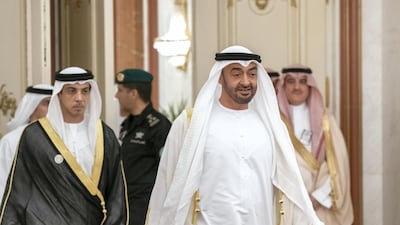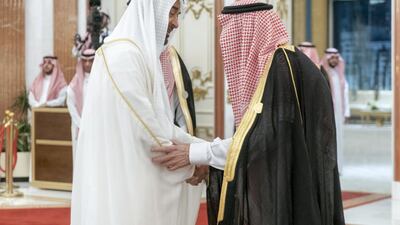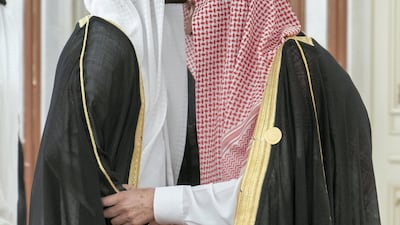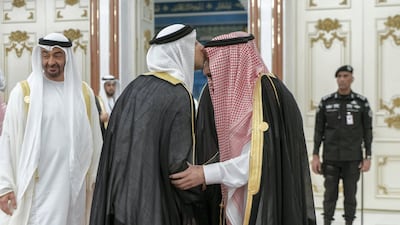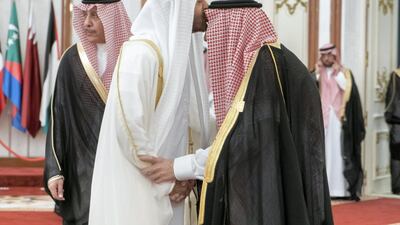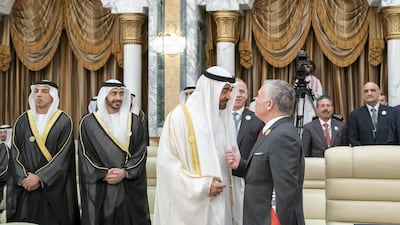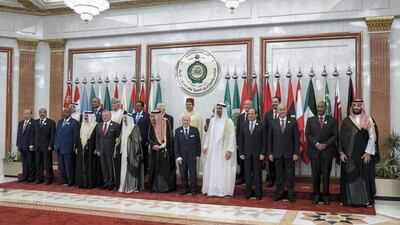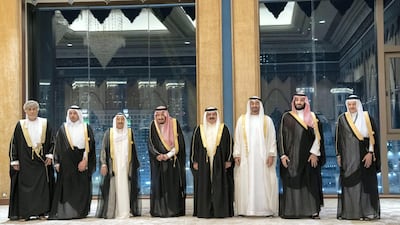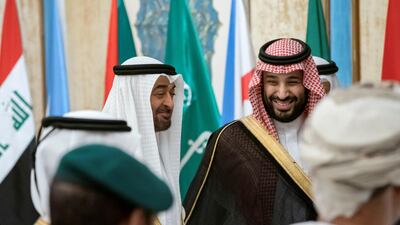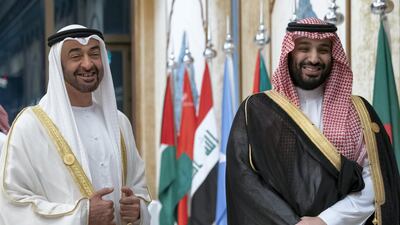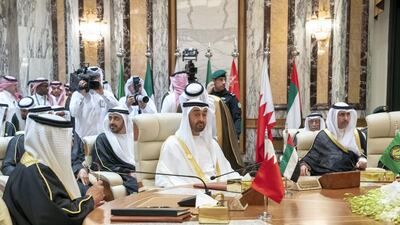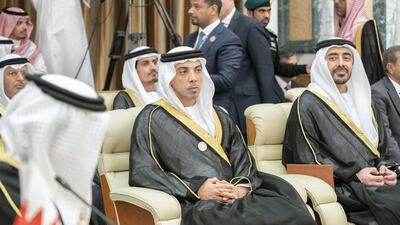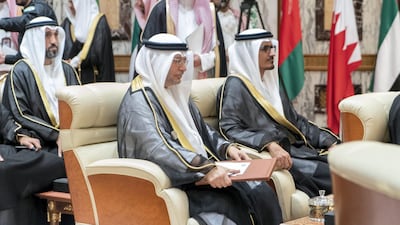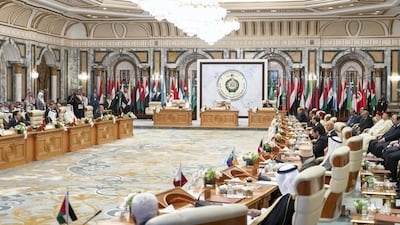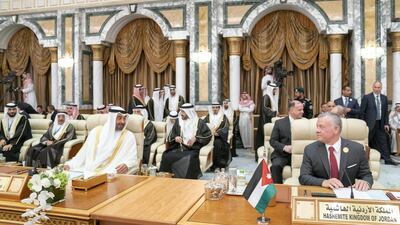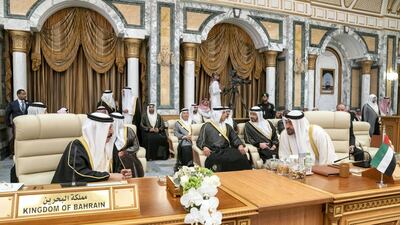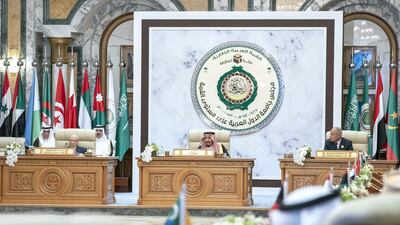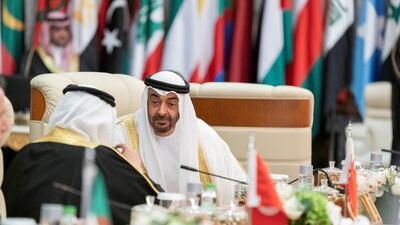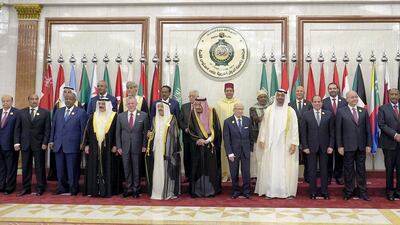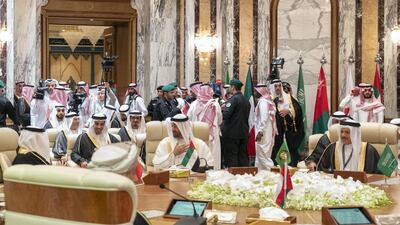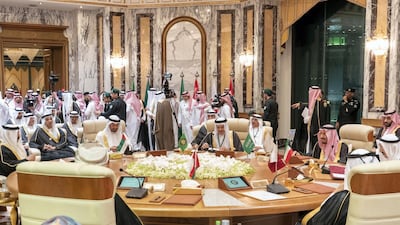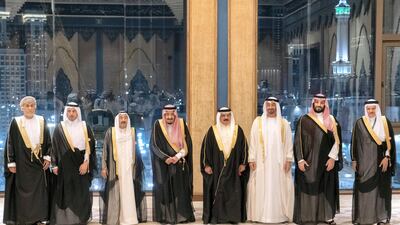Gulf leaders meeting in Makkah have condemned the "acts of sabotage" on four tankers in the UAE's regional waters and drone attacks on Saudi Arabia's oil facilities.
On Saturday, Saudi Arabia's King Salman warned that "terrorist" attacks in the region could imperil global oil supplies.
"We confirm that terrorist actions not only target the kingdom and the Gulf region, but also target the safety of navigation and world oil supplies," the king told a meeting of the Organisation of Islamic Cooperation (OIC).
It follows an earlier communique on Friday, when OIC described the attacks on the commercial vessels, including an Emirati oil tanker, as ''a dangerous development'' that threatens the security and safety of marine navigation in the strategic region and reflects negatively on the regional and international peace and security as well as on world oil markets.
''The GCC stands in solidarity with the UAE and supports any measures and steps taken by the UAE to protect its security, stability and territorial safety," it stated.
It also called on the international community and international marine navigation organisations to shoulder their responsibilities to prevent a recurrence of such acts.
King Salman of Saudi Arabia, who was joined in Makkah by Gulf leaders who included Sheikh Mohamed bin Zayed, Crown Prince of Abu Dhabi and Deputy Supreme Commander of the UAE Armed Forces, had earlier urged Gulf Arab states to take a strong stance to confront Iran's "criminal" actions in the region.
At the start of high-level emergency summits held in Makkah on Thursday night, King Salman, who convened the gatherings earlier in the month, said that everyone had to work together.
"The Iranian regime's interference in the internal affairs of the countries of the region, development of nuclear and missile programmes, and its threats to freedom of international shipping are a threat to global oil supply," he said.
"Recent criminal acts require that all of us work seriously to preserve the security of GCC countries."
He was referring to attacks this month on oil tankers off the UAE coast and on oil pumping stations in the kingdom.
On Thursday night, US Secretary of State Mike Pompeo blamed Iran for the recent attacks, saying it was an effort by Tehran to raise the global price of oil.
“These were efforts by the Iranians to raise the price of crude oil throughout the world,” he said.
He suggested he had seen evidence of Iran's involvement cited earlier by White House National Security Adviser John Bolton.
Mr Bolton had said on Wednesday that Iran was almost certainly behind the sabotage of four ships, including two Saudi oil tankers, off the coast of Fujairah. Tehran rejected the accusation.
Iran-backed Houthi rebels in Yemen have stepped up drone attacks on the kingdom, one of which resulted in the temporary shutdown of a major oil pipeline.
Riyadh called the emergency meetings of leaders from the Gulf region, the wider Arab world and of Islamic nations to discuss the standoff with Iran and ways of isolating Tehran amid fears of a military confrontation.
Sheikh Mohamed said King Salman's convening of the emergency meetings reflected the Saudi ruler's "profound awareness of the delicacy of the current developments" and the "pivotal role played by Saudi Arabia in closing Arab ranks and underpinning joint Arab action amidst a highly volatile and tense regional and international environment".
In statements marking the emergency Arab summit, the Crown Prince of Abu Dhabi stressed the importance of building "an efficient, unified Arab stance" towards current challenges.
"Guaranteeing regional security is the prime responsibility of Arabs in the first place, and herein lies the central importance of the Arab summit in Makkah in terms of its timing, venue and message," he said.
Earlier on Thursday, Saudi Arabia's Foreign Minister urged Muslim nations to respond to the recent attacks with "all means of force and firmness".
Ibrahim Al Assaf was speaking at a meeting of foreign ministers of the 57-nation Organisation of Islamic Co-operation.
Mr Al Assaf said the sabotage of the tankers and drone attacks on the Saudi pipeline required the region to "make more efforts to counter the terrorist acts of extremist and terrorist groups".
Speaking on Friday after the GCC meeting Mr Al Assaf said that the Gulf states had expressed their desire for peace and co-operation with Iran, but "Iran must stop supporting terrorist acts in our countries and be a co-operative neighbour".
The Secretary-General of the GCC, Abdullatif bin Rashid Al-Zayani, affirmed that the presence of Gulf states at their Makkah summit is an affirmation of the unity in their ranks and their determination to achieve security and peace. "The GCC is a cohesive entity that is capable of facing all challenges with great confidence, steadfastness, and unswerving determination," he said.
An Iranian official attended the meeting with Mr Al Assaf on Thursday, but Iranian Foreign Minister Javad Zarif was absent.
On their arrival at the airport, each leader was shown Houthi military items, such as a destroyed drone, missiles and mortar shells used in the conflict in Yemen.
The leaders were given a brief explanation of the weapons on display by Col Turki Al Malki, spokesman for the Aran Coalition at war in Yemen.
Adel Al Jubeir, Saudi Minister of State for Foreign Affairs, said the onus was on Tehran to reduce the tension.
"A war would be damaging to everyone in the region and we want to avoid it at all costs," Mr Al Jubeir told the BBC. "We have made that very clear. The ball is really in Iran’s court."
The Qatari Prime Minister, Sheikh Abdullah bin Nasser Al Thani, also attended the summits in Saudi Arabia on Thursday and Friday, which coincide with the final days of Ramadan.
It was the highest-level visit since Saudi Arabia, the UAE, Bahrain and Egypt cut diplomatic ties with Doha two years ago over it support for terrorism and ties with Iran.
The visit comes as tightening US sanctions raises tension in the Gulf a year after President Donald Trump pulled the US out of a 2015 nuclear deal between Tehran and world powers.
The US has accused Tehran of being behind at least three attacks this month, including a rocket strike near the US embassy in Baghdad
